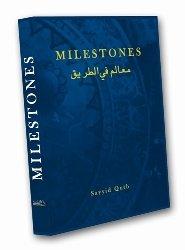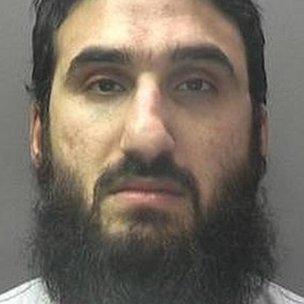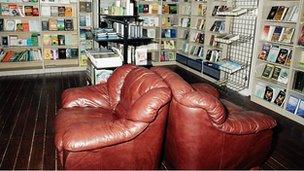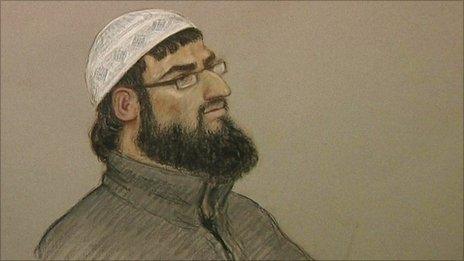Analysis: Why a 'terror bookseller' won his appeal
- Published
- comments

Milestones: Adapted edition of the text at heart of the trial
Can someone be convicted of disseminating books which are arguably so extreme in nature they've played a role in encouraging terrorism and political violence?
That was the question in the trial - and subsequent appeal - of a Birmingham bookseller who in 2011 was convicted of selling jihadist literature, the first substantial case of its kind.
The Court of Appeal has overturned some - but not all - of the convictions of Ahmed Faraz. The case was complex and it raises questions about how the how far the state can go in pursuing someone whom the security services believe is playing an important background role in the ideology of violence, even if they are not themselves directly involved.
During the trial at Kingston Crown Court, the jury heard that Faraz had disseminated and distributed material, through his Maktabah Islamic Bookshop in Birmingham, that prosecutors said encouraged militant jihad.
He was initially facing a whopping indictment of 30 counts relating to different books or videos seized from the business - but that was later whittled down to a list that was more manageable for the jury.
Five of the counts related to Faraz's dissemination of books that have been part of the rallying call by Islamists to jihad.

Ahmed Faraz: Denied charges
One of them concerned a "special edition" of Milestones by Sayyid Qutb produced by the bookshop. Milestones is a very important book in the modern history of Islamism, found on the shelf of anyone who has studied the subject.
The prosecution said that Faraz had taken Qutb's original version of Milestones and added more extreme material which amounted to encouraging terrorism.
Some of the other texts he was accused of disseminating were fairly well-known accounts of various jihadist exploits, such as the fight against the Soviet Union in Afghanistan.
In short, the prosecution said Faraz was distributing material that was designed to prime people for terrorism, even if he was not involved in it himself.
Ahmed Faraz's defence was that none of the publications encouraged terrorism; they were simply publications that encouraged intelligent discussions on religious and political theory - and that he also had a legitimate academic interest in some of the material. He had taken some of the more extreme material off the shelves and had planned to dump it - but never got round to it, it was said.
The jury convicted Faraz of seven counts of dissemination of terrorist publications, relating to the dense books of philosophy that the prosecution said encouraged violent jihad.
He was also found guilty of a second set of charges concerning material likely to be useful to someone preparing an act of terrorism. These included practical instructions for homemade bombs and other material such as a handbook called "The AQ Training Manual".
Court of Appeal challenge
Faraz was jailed for three years and investigators were delighted to have taken down a man, and a bookshop, that they believed had played a critical ideological role in the British jihad. But the bookseller appealed against his convictions relating to the theological material - because he maintained it couldn't be considered to be encouraging terrorism in the first place. He did not challenge his conviction on the second set of charges.

Bookshop: Included adapted versions of well-known texts
The UK doesn't maintain a list of banned books - the days of the official censor are long since gone.
So it had always been for prosecutors to prove beyond reasonable doubt that Ahmed Faraz's material could be considered unlawful and terrorist in nature.
During the trial, the jury heard that some of the most dangerous men in the UK, such as those convicted of the 2006 airline bomb plot, had possessed material that was distributed by the Maktabah bookshop. Before he went on his last lethal journey, Mohammed Sidique Khan, the ringleader of the 7/7 suicide bombings, placed three texts which were available via Maktabah in a bag alongside his will.
The prosecution went on to say that roughly a quarter of terror investigations had found some of the publications in the possession of suspects.
It argued that this indirect connection between the defendant and others convicted of terrorism, through the material he distributed, was crucial to deciding whether Ahmed Faraz supplied books that encouraged terrorism.
But the defence said that connecting the bookseller to these convicted men was grossly unfair because there could be all manner of reasons why they had turned to violence - and we don't know what role the books had played.
Probable, but not provable
In its quite complex ruling, which you can read in full here, external, the Court of Appeal said that it was probable that some people who had read the books were already militant Islamists who might have been further encouraged.
But they said that was not proof that any of the books had indeed encouraged acts of terrorism.
Lord Justice Pitchford said: "The danger is that the jury would condemn the publication purely by reason of its association with known terrorists. The temptation to move to the conclusion that terrorists would not be in possession of a publication unless it encouraged them to acts to terrorism is a powerful one; but such a conclusion would, of course, be speculative, unfair and prejudicial."
So the Court of Appeal quashed the seven convictions relating to the theological material because it was impossible for the prosecution to prove that Ahmed Faraz had disseminated them with a terrorist purpose.
Ahmed Faraz was released from prison - but because his other convictions still stand, he is now subject to arrangements designed to monitor the whereabouts of people who have served sentences for terrorism offences.
The Court of Appeal did not, however, rule on whether the content of the theological and philosophical publications should or should not be considered terrorist in nature. It has left that question open.
Hypothetically, there could one day be another trial of someone accused of disseminating the same material. And another jury would face the daunting task of examining the issue again.
- Published12 December 2011

- Published13 October 2011
